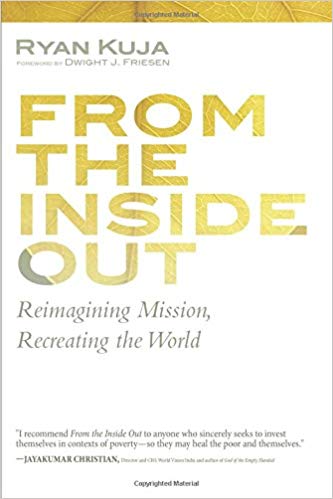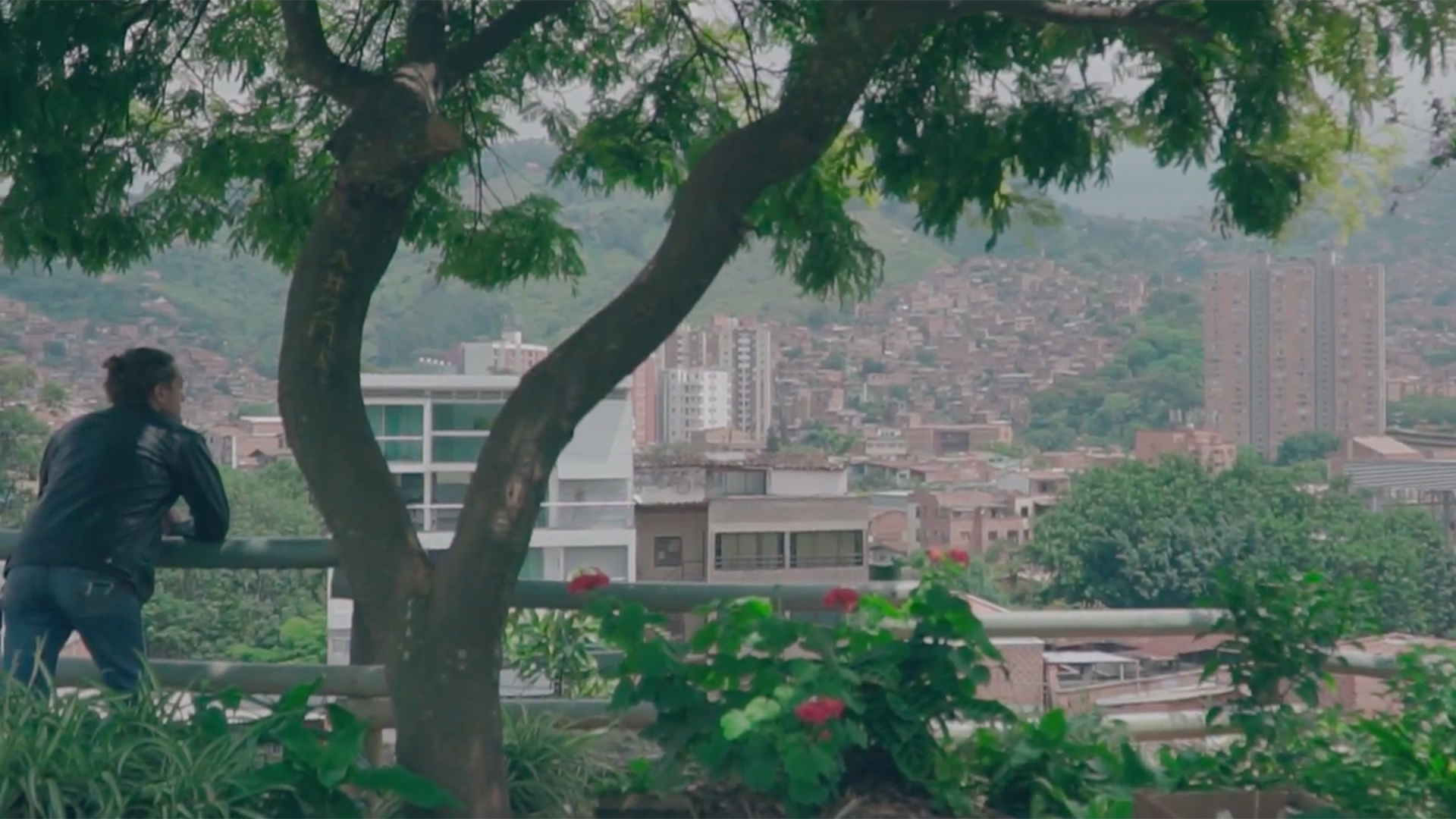A global citizen with a background in international mission, relief, and development, Ryan Kuja has lived in fifteen cities and rural villages on five continents. He holds an MA in Theology & Culture from The Seattle School, as well a Diploma in Humanitarian Assistance from Liverpool School of Tropical Medicine. A spiritual director and writer, his work has appeared in Sojourners, Missio Alliance, Presence Journal, and several theological journals. His first book, From the Inside Out: Reimagining Mission, Recreating the World, released in June. Ryan is currently serving as the Field Director of Word Made Flesh in Medellin, Colombia, where he lives with his wife. You can find him online at ryankuja.com and on Twitter as @ryankuja.
For our recent Continuing Conversations alumni newsletter, we talked with Ryan about vocation, shame, how his education at The Seattle School informs his work, and the rhythms and practices that sustain him in his calling.
In what ways has your story impacted, shaped, or inspired your vocation?
 For several years before attending The Seattle School, I worked in the realm of international relief and development in South Sudan, Kenya, South Africa, Mozambique, India, the Caribbean, and Europe. At one point, everything came crashing down. My whole life collapsed. I was mentally, physically, and spiritually bankrupt, and my understanding of my vocation and what it meant to serve the materially poor in difficult contexts began to shift. The bottom fell out, and that forced me to go inside myself, to examine everything I’d been doing and to enter into a long, arduous process of questioning my old assumptions and beliefs. In many ways, the convergence of vocation and the collapse of vocation—at least how I understood it then—became the crucible in which the next season of my story was molded.
For several years before attending The Seattle School, I worked in the realm of international relief and development in South Sudan, Kenya, South Africa, Mozambique, India, the Caribbean, and Europe. At one point, everything came crashing down. My whole life collapsed. I was mentally, physically, and spiritually bankrupt, and my understanding of my vocation and what it meant to serve the materially poor in difficult contexts began to shift. The bottom fell out, and that forced me to go inside myself, to examine everything I’d been doing and to enter into a long, arduous process of questioning my old assumptions and beliefs. In many ways, the convergence of vocation and the collapse of vocation—at least how I understood it then—became the crucible in which the next season of my story was molded.
Eventually, I came to a point where I knew I needed to go to seminary to have the context in which to go deeper theologically, but also psycho-spiritually. A key part of that season was the years I spent at The Seattle School. There, I was able to deepen my personal, interior journey while also engaging mission and cross-cultural ministry from an academic perspective. The book I wrote which was published in June, From the Inside Out, began to take shape as I worked on integrating my personal narrative and experiences working overseas with theology and missiology. The seeds of the book were planted through doing this work of integration.
How has your work been informed by your education at The Seattle School?
With regard to ministry, it is rare that we reflect on our own trauma, wounds, style of relating, unmet needs, and how all of that impacts how we show up somewhere to serve marginalized people. The Seattle School invited me to stop trying to escape my own story and instead, engage my story as a bridge into the heart of my vocation and the heart of the gospel. We can never escape our own stories, yet so often that is what we are told we must do—to live above it all on the journey to do what we are called to do with our lives. But that is a lie. The movement to escape is a movement into further disintegration and unhealth. It also moves us away from the gospel. We enter into the gospel when we enter into our own pain. And when we enter into the sites of our own suffering, that is when ministry ceases to be a one-way street where the “whole” condescend to help the “broken” and instead, ministry becomes a context in which there is the potential for robust mutuality, in which the false dichotomy of “whole” and “broken” collapses. We recognize shared brokenness and live out of that place, learning to lead with wounds open and exposed rather than hidden.
What breaks your heart, and how is your work informed by that kind of shattering?
So many things break my heart. With regard to the work I am engaged in, the shame-poverty cycle is certainly one. Poverty and shame go hand-in-hand because blame is so often assigned to individuals and communities living in the indignity of severe economic conditions. Blame has to be re-assigned to a different realm, a realm that underlies their situation: the systems and structures of inequality that give rise to these conditions in the first place. Is there personal responsibility involved? Yes, of course. We each have choices to make regardless of where we live. But there is a myth that personal responsibility is the only factor. It isn’t. We all live within systems—political, social, economic, religious. Those systems work for some of us and offer benefits to some of us. For others, it is just the opposite. These systems keep some locked into this shame-poverty cycle.
In order for economic poverty to be addressed, there is a primary need for judgment to be shifted from those suffering from poverty to the systems that create and sustain it. Again, to address and work with shame is key here. But often foreigners show up somewhere with the best of intentions without understanding the deeper dynamics of poverty. And so they unwittingly perpetuate a sense of shame and helplessness, reinforcing harmful historical patterns without realizing it. If we don’t see the root of poverty clearly, how we try to address it will often create more problems, contributing to a sense of helplessness and hopelessness, which then leads to self-blame and more shame. I see this as a key aspect of working with vulnerable communities across cultures, and it is something I try to center in my own current work in Colombia.
What vocational rhythms or practices have you implemented?
It is easy to become captive to an idea that we are called to only change the world while ignoring ourselves. But that is only half the gospel—the half that I am continually tempted to live according to. Contemplation has been a key practice in being true to my vocation rather than believing and living according to the illusions of the false self that claims I should ignore myself and my own needs. Contemplative prayer reminds me I am finite, limited, not in control—and it does so in a way in which I can rest in the One who is everything that I can never be and do not need to be. As the false self fades into the background, I can sense that God is not the source of the drivenness and the compulsions that push me to exhaustion and disintegration.
Through contemplative prayer, I can sense that God is drawing me into greater health and integrity and transformation, and I can rest in that. The striving ceases. The need to be important fades. And I can sense my belovedness. Healthy ministry then flows out of this centered, grounded place.
About Ryan Kuja’s New Book
 From the Inside Out weaves together stories from my own experience living with marginalized people around the globe with biblical and theological reflection, psychology, and spiritual formation. It challenges many widespread misconceptions of cross-cultural ministry and invites us to awaken to a fresh and liberating engagement with God’s redeeming work in the world, while offering a new way forward marked by memory, mysticism, mutuality, and imagination.
From the Inside Out weaves together stories from my own experience living with marginalized people around the globe with biblical and theological reflection, psychology, and spiritual formation. It challenges many widespread misconceptions of cross-cultural ministry and invites us to awaken to a fresh and liberating engagement with God’s redeeming work in the world, while offering a new way forward marked by memory, mysticism, mutuality, and imagination.
To hear more Ryan’s journey and the work he does in the world, check out this conversation on A Sacred Journey, a podcast from fellow alumnus Lacy Clark Ellman (MA in Theology & Culture, ’12).

